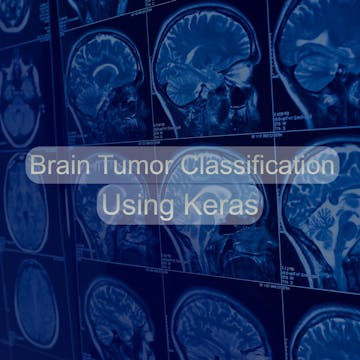
In this 2-hour-long guided project, we will use an efficient net model and train it on a Brain MRI dataset. This dataset has more than 3000 Brain MRI scans which are categorized in four classes - Glioma Tumor, Meningioma Tumor, Pituitary Tumor and No Tumor. Our objective in this project is to create an image classification model that can predict Brain MRI scans that belong to one of the four classes with a reasonably high accuracy. Please note that this dataset, and the model that we train in the project, is for educational purposes only.
Project Prerequisite: Before you attempt this project, you should be familiar with...
Read more
Good to know
Save this course
Reviews summary
Excellent beginner-friendly brain mri classification course
Activities
Enroll in Guided Python Tutorial
Show steps
This tutorial can help you brush up on Python basics like variables, functions, and data structures which will enhance your understanding of the course concepts.
Browse courses on
Python
Show steps
-
Sign up for a guided Python tutorial on a website like Codecademy or W3Schools.
-
Complete the tutorial at your own pace, taking notes as needed.
Practice Python Exercises
Show steps
Solving coding exercises will provide hands-on practice with Python concepts covered in the course.
Browse courses on
Python
Show steps
-
Visit websites like LeetCode or HackerRank to find Python coding exercises.
-
Choose a few exercises and try to solve them on your own.
-
Review solutions and identify areas for improvement.
Develop a Basic Python Project
Show steps
Working on a project will allow you to apply the course concepts, foster creativity, and build a portfolio.
Browse courses on
Python
Show steps
-
Identify a simple Python project idea such as a calculator, text editor, or game.
-
Design the project structure, including modules and functions.
-
Implement the code and test it thoroughly.
-
Refine the project based on testing and feedback.
Show all three activities
Enroll in Guided Python Tutorial
Show steps
This tutorial can help you brush up on Python basics like variables, functions, and data structures which will enhance your understanding of the course concepts.
Browse courses on
Python
Show steps
- Sign up for a guided Python tutorial on a website like Codecademy or W3Schools.
- Complete the tutorial at your own pace, taking notes as needed.
Practice Python Exercises
Show steps
Solving coding exercises will provide hands-on practice with Python concepts covered in the course.
Browse courses on
Python
Show steps
- Visit websites like LeetCode or HackerRank to find Python coding exercises.
- Choose a few exercises and try to solve them on your own.
- Review solutions and identify areas for improvement.
Develop a Basic Python Project
Show steps
Working on a project will allow you to apply the course concepts, foster creativity, and build a portfolio.
Browse courses on
Python
Show steps
- Identify a simple Python project idea such as a calculator, text editor, or game.
- Design the project structure, including modules and functions.
- Implement the code and test it thoroughly.
- Refine the project based on testing and feedback.
Career center
Data Scientist
Machine Learning Engineer
Deep Learning Engineer
Computer Vision Engineer
Medical Imaging Analyst
Neurologist
Neurosurgeon
Radiologist
Biomedical Engineer
Software Engineer
Data Analyst
Statistician
Operations Research Analyst
Business Analyst
Quality Assurance Analyst
Reading list
Share
Similar courses
OpenCourser helps millions of learners each year. People visit us to learn workspace skills, ace their exams, and nurture their curiosity.
Our extensive catalog contains over 50,000 courses and twice as many books. Browse by search, by topic, or even by career interests. We'll match you to the right resources quickly.
Find this site helpful? Tell a friend about us.
We're supported by our community of learners. When you purchase or subscribe to courses and programs or purchase books, we may earn a commission from our partners.
Your purchases help us maintain our catalog and keep our servers humming without ads.
Thank you for supporting OpenCourser.


